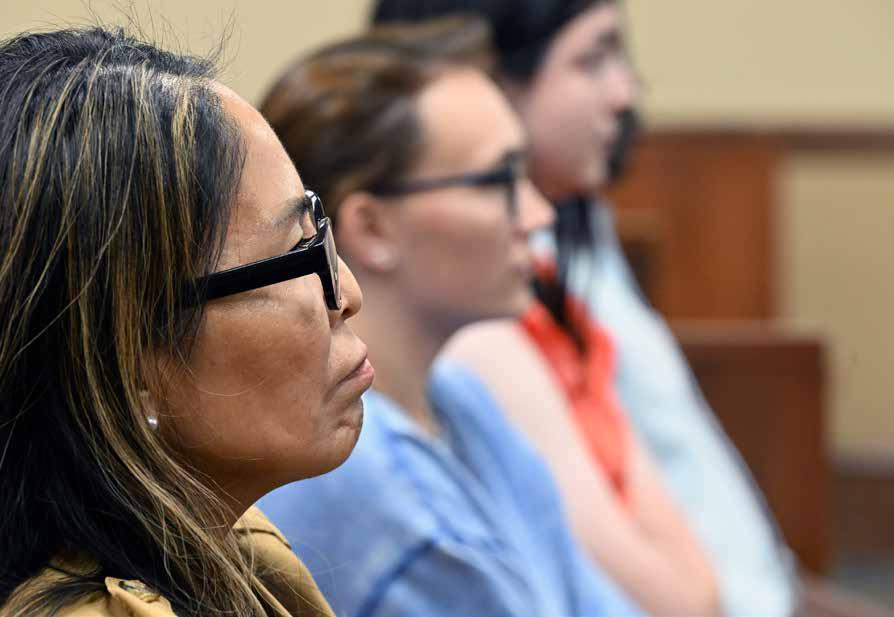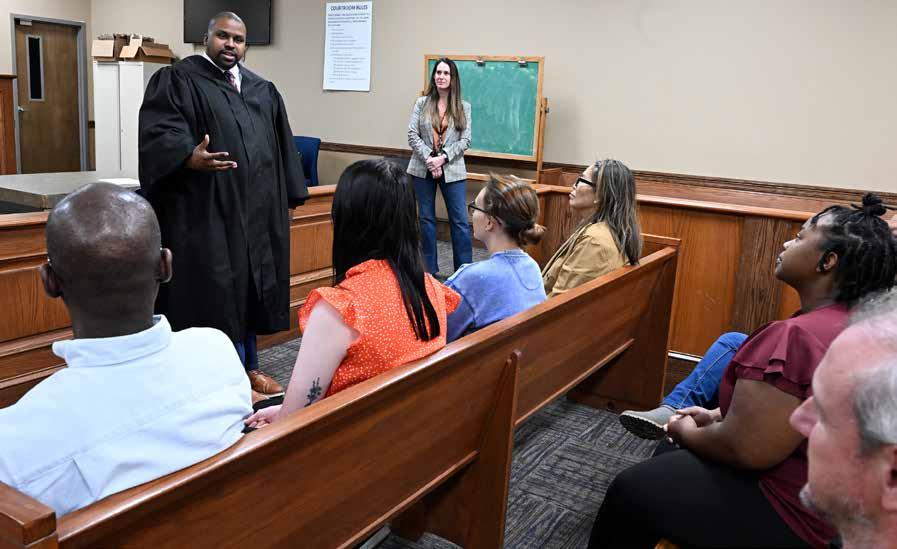
4 minute read
MSU-MERIDIAN CRIMINOLOGY STUDENTS GET BULLDOG EXPERIENCE IN NIGHT COURT
By Marianne Todd
Judge K. Dustin Markham is a man of large stature, so when he approached a group of Mississippi State University students in his long, black robe, he had their full attention.
“Let me explain what just happened here,” he told the students, detailing the hearing that had just taken place in his municipal courtroom. The defendant, charged with murder, had been out of jail on bond and was returned to Markham’s court after being found in possession of an assault rifle.
It was a courtroom drama MSUMeridian Associate Professor of Criminology Amanda Cook Cox couldn’t have planned better.
As part of MSU’s Quality Enhancement Plan, Cox hoped her MSUMeridian criminology students would glean practical experience from observing night court. She got her wish.
“The students were fascinated,” Cox said. “The judge introduced them to the prosecutor and the chief public defender. They met police and the bailiff. All these people spent time talking to them. They told them, ‘This is what I do on a day-today basis.’”
Students had a chance to ask questions, and breaks were taken between cases so the judge could provide the students with case details.
As part of her research, Cox has tracked data for Meridian’s municipal court since 2016 and assisted the court in developing data-driving strategies to improve appearance rates for misdemeanor defendants. From her courtroom seat next to Markham, she is well-acquainted with court officials. In fact, her own MSU-Meridian graduates fill positions including chief public defender, bailiff and crime scene investigator.
Cox said she was surprised by the passion with which court officials engaged her students.
“I want my students to get their hands on every part of the system,” Cox said. “I want them to see the people working in these positions—to talk to them and get to know them. I want them to learn what you can do with a criminology degree— that you can be in law enforcement, go to law school, work in victim’s services, be a paralegal or be a public defender.”
Students also were invited to talk to defendants at the community treatment center, TAME, where offenders fulfill alternative sentencing such as anger-management and drug-abuse classes.
“There is a technique of neutralization, where the men who are prosecuted in domestic disturbances will blame the women and the system instead of themselves,” said Jesse Knight, a firstsemester criminology student. “In one particular moment, one of the offenders stated he believed the system would believe only the women. The other fellows there spoke up and agreed with that sentiment. We had studied this in class, and it actually did happen. It was like seeing the textbook come to life.”
Cox said the experience allows students to examine criminal behavior up close.
“Every week we look at different approaches to explaining criminal behavior, but what’s the point of knowing why someone commits a crime if you can’t do anything about it?” Cox asked.
David Buys, MSU-Meridian associate vice provost for health sciences and interim head of campus, said Cox’s approach is a great example of what a Bulldog Experience should be through the university’s Quality Enhancement Plan.
“Textbooks and classrooms, of course, provide the basis for learning, but these real-life experiences—the chance to observe different professions in a field, ask questions and even participate—really provide students with an acute awareness of their chosen fields,” he said.
“From that grows limitless opportunities for expansion. This experiential learning is something we really strive to provide for all MSU-Meridian students,” Cox said. She wants her student to go beyond coursework rather than just “check a box for graduation.”
“I want them to leave this program with a deeper understanding of crime and justice issues in Mississippi and a desire to stay local and be part of the solution,” she said. “I am from Mississippi, and most of our students are also proud to call Mississippi their home. This puts them in a unique position to provide expertise to our local communities when they graduate.”
This spring semester, the students are taking a deeper dive into the Quality Enhancement Plan by preparing research findings to be used by local agencies in grant applications. To do this, they will analyze drivers of crime through their Community Crime Prevention class. u



Associate Professor Amanda Cook Cox watches as Municipal Judge K. Dustin Markham talks to her MSUMeridian criminology students as part of the Bulldog Experience.









